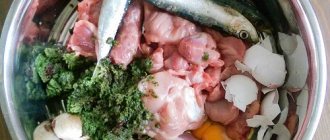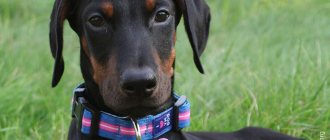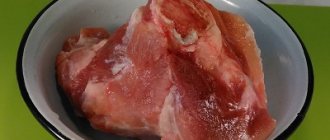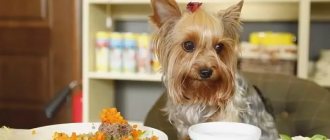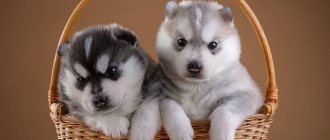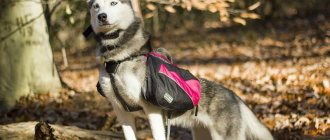Huskies are active, hardy dogs with an attractive appearance and complex character.
Despite the fact that, in general, representatives of this breed are unpretentious and do not require specific care and education, the issue of feeding them must be approached as responsibly as possible.
Because the appearance, health of the pet, and its life expectancy depend on it.
Natural food or artificial food?
The Husky diet can be based on both natural products and industrial food . It is impossible to say unequivocally which type of nutrition is better - each has advantages and disadvantages, supporters and opponents.
The only thing we can say with confidence is that nutrition must be balanced and take into account the age, health and physiological characteristics of the dog.
It is strictly forbidden to mix both types of food, since the animal’s body produces different enzymes to process natural products and feed..
A mixed diet has a negative impact on the dog's health and can lead to gastrointestinal problems.
Breeders who choose natural food for their pets motivate this mainly by the fact that all the nutrients entering the dog’s body with such a diet are of natural origin and are better absorbed.
At the same time, dry food contains all the necessary vitamins and minerals necessary for the healthy growth and proper development of a husky.
Huskies do not have a tendency to overeat and become obese and, unlike other breeds, these dogs have a protein-fat, rather than a protein-carbohydrate metabolism..
Expert opinion
Tolkachev Andrey Mikhailovich
veterinarian
The main mistake of inexperienced dog breeders is mixed nutrition. This is what most often leads to the development of various pathologies associated with the gastrointestinal tract of dogs. Also, many people mistakenly believe that natural food allows you to feed the dog leftovers from the common table, which is fundamentally wrong. That is why most breeders prefer to use industrial food that contains everything necessary for the pet’s health and has a balanced composition. Such food is easy to store and use, and the recommended daily serving size is already indicated on the packaging. The owner’s only task is to choose food that takes into account the characteristics and needs of a particular dog.
Ready food
Store-bought food consists of canned food and dry granules.
Advantages of ready-made food:
- quick cooking;
- contains all the necessary substances;
- ease of use and transportation;
- developed menu.
Disadvantages include::
- lack of moisture;
- difficulties in selection;
- expensive;
- presence of preservatives;
- inability to provide natural products.
Attention! It is strictly forbidden to mix natural food with prepared food! These are too different types of food.
General recommendations for healthy feeding at home
Proper nutrition is one of the main components of healthy growth and development of a dog.
To eliminate possible mistakes regarding feeding your pet, you must follow several recommendations:
- the diet should consist of 70% dietary meat;
- you need to give your dog both boiled and raw vegetables;
- approximately 10% of the diet consists of cereals such as rice and buckwheat;
- Adult dogs should not be given milk, but fermented milk products are necessary to ensure proper functioning of the gastrointestinal tract;
- Do not feed your husky food too cold or hot;
- It is prohibited to mix industrial feed and natural products;
- all food must be fresh, prepared from high quality products;
- it is important to follow the feeding regime;
- with a natural diet, it is necessary to give your pet additional vitamins and minerals;
- The dog should always have drinking water freely available.
You should not feed your dog before bedtime, walks or trips in public transport or a car . The bowl of food should be left for 20-30 minutes, after which it should be removed, even if the dog has not eaten everything.
It is necessary to ensure that the pet receives vitamins A, E, C, D, B, K, PP, calcium, copper, iron, iodine, zinc, as well as glucosamine, collagen, chondroitin and polyunsaturated acids.
Problems
Sometimes Huskies may have problems with feeding. This could be due to the food being at an inappropriate temperature or size. It is also possible that the dog is simply tired of a certain food, so the menu should be varied and healthy.
Doesn't eat well
It often happens that a husky becomes capricious and refuses to eat as before due to poor appetite. Often this is a dog’s normal attitude towards food; she eats poorly, but is active and, if there are no signs of illness, then there is no need to worry. The fact is that by their nature, huskies do not tend to eat a lot, and the dog’s poor appetite should not cause you concern.
Refuses to eat
In summer, in hot weather, huskies can abstain from food for 1-2 days on their own. This shouldn't scare you. However, if the dog refuses to eat for more than two days, then it needs to be seen by a veterinarian.
Fat dog
It is very important to ensure that Huskies do not gain excess weight. Dogs of this breed are characterized by a slight degree of thinness, but without signs of exhaustion. Normally, a Husky's spine and ribs should be palpable. If you cannot do this, then the dog is overweight.
Attention! Excess weight can cause problems with the cardiovascular, digestive and musculoskeletal systems in huskies.
Pros and cons of natural food
A natural diet allows the owner to independently choose food for the dog, controlling their quality and freshness.
In addition, this type of nutrition has a number of other advantages.:
- the composition does not contain chemical dyes, flavors, flavor enhancers and preservatives, which not only do not provide any benefit to the dog, but can also adversely affect its health;
- all vitamins and macro- and microelements contained in the products are of natural origin and are better absorbed by the animal’s body;
- If your pet has an allergic reaction to one of the products, it can be replaced with an analogue without changing the entire diet.
In addition, with a natural diet, you can make the husky’s menu as varied as possible, which will minimize or completely eliminate the likelihood that the dog will get bored with food.
The disadvantages of this type of nutrition include:
- large amounts of time spent preparing food for your pet;
- inconveniences associated with feeding while traveling;
- lack of opportunity to prepare food for future use.
It is also important to understand that it is impossible to independently create a balanced diet for a husky without certain knowledge of veterinary nutrition..
Features of the Husky breed
Husky is a native, working dog breed bred to carry small loads over long distances. The history of the breed is shrouded in fog, but there is an assumption that the ancestors of the husky are polar wolves. Modern representatives of the breed are practically not used for working purposes and are considered as show class dogs.
The characteristics of the breed make a husky a natural disaster if a puppy is purchased only for appearance or fashion. Huskies are very active, often run away, and require careful and labor-intensive care. Training a Husky requires some experience or the help of a professional.
List of permitted and prohibited products
When choosing natural food in the husky menu, you must include:
- meat (beef, veal, poultry, rabbit) is a source of protein, iron, magnesium, calcium, vitamins A, E, D;
- offal (trachea, tripe, liver, lungs, ears, lips, tendons, tails) - to preserve the maximum amount of useful substances, you need to purchase and cook them in an unrefined form;
- sea fish without bones, scales, gills, intestines (salmon, salmon, pink salmon) - contains protein, zinc, magnesium, calcium, iodine;
- boiled eggs are a source of protein, animal fat, organic acids, vitamins and microelements;
- eggshells - a small amount as an additional source of calcium;
- fermented milk products (natural yogurt, kefir, cottage cheese) are a source of calcium and contribute to the normal functioning of the gastrointestinal tract;
- animal and vegetable fats (fish, olive, soybean, sunflower, corn oil);
- vegetables and fruits (carrots, tomatoes, pumpkin, cabbage, zucchini, turnips) are a source of vitamins C, B, A, fiber, microelements and acids;
- cereals (rice, buckwheat, oatmeal);
- large "sugar" bones.
You can't feed the husky:
- confectionery products;
- grapes and raisins;
- pork and lamb;
- pickles, smoked meats;
- oranges, tangerines;
- potatoes;
- milk;
- spicy, salty foods;
- tubular bones;
- river fish;
- bread and baked goods;
- pasta;
- legumes;
- chicken feet and bones;
- lard;
- nuts.
It is also prohibited to give your dog vitamins intended for humans and leftovers from the common table.
Sample menu for the week
| Day of the week | Daily menu | Menu under workload |
| Monday | 400 g chicken meat, sprinkled with yogurt, 150 g buckwheat porridge, 1 tsp. vegetable oil, 150 g boiled carrots and beets | 300 g chicken meat, 200 ml yogurt, 2 boiled carrots, 150 g internal organs, offal and trimmings, 150 g buckwheat porridge, 130 ml kefir |
| Tuesday | 450 g veal kidneys and offal, 200 ml kefir, 130 g green vegetables | 250 g sea fish, 150 g rice porridge, 1 raw egg, 250 g offal, 150 g yogurt, 120 g boiled vegetables |
| Wednesday | 500 g pink salmon, 150 g rice porridge, 200 ml natural yogurt | 300 g beef, 120 g yogurt, 1 tsp. vegetable oil, 120 g boiled cabbage and beets, 200 g buckwheat porridge, 150 g cottage cheese, 1 apple |
| Thursday | 450 g rabbit or beef, 150 g yogurt, 130 g boiled carrots and celery, 1 raw egg | 250 g chicken waste, 150 g oatmeal, 20 g boiled carrots, 1 tsp. vegetable oil, 250 g rabbit meat, 200 ml yogurt, 120 g boiled pumpkin, 1 raw egg |
| Friday | 450 g internal organs, offal, poultry trimmings, 150 g oatmeal, 150 g cottage cheese, 1 tsp. vegetable oil | 300 g chicken fillet, 280 ml yogurt, 130 g boiled beets and celery, 1 tsp. vegetable oil, 200 g oatmeal, 150 g cottage cheese, 1 apple |
| Saturday | 450 g veal, 200 g natural yoghurt, 130 g boiled pumpkin, 1 raw egg | 250 g sea fish, 150 g rice porridge, 1 raw egg, 200 g beef offal and trimmings, 150 ml yogurt, boiled carrots |
| Sunday | 250 g buckwheat porridge with meat, 200 g cottage cheese, 150 ml natural yogurt, 1 apple | 300 g veal, 150 g buckwheat porridge, 280 ml yogurt, 1 tsp. vegetable oil, 200 g offal, 130 g boiled vegetables, 1 egg |
Industrial feed
As with natural nutrition, feeding with industrial feed has both advantages and disadvantages.
The advantages of such a diet include:
- balanced composition, enriched with all necessary vitamins, macro- and microelements, which eliminates the need to take additional nutritional supplements;
- saving time on preparing food for your dog;
- simplicity and ease of use and storage;
- the opportunity to buy food for the husky for future use;
- indication on the packaging of information regarding the daily intake of feed.
A wide range of industrial feeds allows you to choose a diet for your pet in accordance with its age, activity level, physiological characteristics and health status.
In addition, a special composition covering dry food granules acts as an additional measure to prevent the formation of plaque and stones.
Disadvantages of this diet:
- Cheap feeds may contain low-quality meat and offal;
- there is a possibility of the presence of artificial colors, flavors, preservatives and flavor enhancers.
It is also important to understand that if an allergic reaction occurs to one of the components of the food, the dog’s diet will need to be completely changed.
NOTE!
Industrial feeds can be not only dry, but also wet - they contain up to 80% liquid.
Products of different quality can be used in feed, which is why they are divided into several classes.:
- economy - the composition is based on low-quality products, the possibility of containing soy, beans, and chemical additives is possible;
- premium - products of this class are based on meat, offal and vegetables, but the composition is not enriched with vitamins and minerals;
- super premium - high quality products are used to make such food; vitamins and minerals are included.
Also, almost every company produces lines of hypoallergenic and holistic food, the composition of which is close to natural nutrition.
Diet
When selecting a diet, not only the necessary substances are taken into account, but also the age, gender of the dog, and its preferences.
For puppies by month
The best food for a one-month-old puppy and younger is mother's milk, after which complementary foods can be introduced.
The baby husky is fed freshly prepared food, which should be given warm.
If he has not eaten in 20 minutes, you need to remove the plate until the next meal. It is most preferable to feed low-fat cottage cheese, fruits, omelettes, meat with porridge, kefir, carrots, and beets from 2 months.
From this age, milk can no longer be given to dogs. Little huskies love to eat sweet fruits, especially apples and bananas. But you need to make sure that their use does not harm the animal.
Expert opinion
Anna Abramenko
An avid dog lover. Experience in veterinary medicine since 2009.
Ask a Question
The daily allowance of meat must be strictly observed, new food should be introduced carefully and gradually so that the small pet does not develop a stomach ache.
If we consider dry artificial food for husky puppies, it is better to choose a super-premium or elite variety, focusing on age. And within 1 month you need to dilute a special mixture and make sure that it has a uniform consistency without lumps.
For an adult dog
It is much more important to maintain a balanced diet. You can give more fish, and vegetables can be cut into small pieces rather than pureed.
It is much more important to maintain a balanced diet. You can give more fish, and vegetables can be cut into small pieces rather than pureed.
For a nursing bitch
During pregnancy, your Husky needs to gradually increase the dose of protein food.
If she was given branded food, then she should not be abruptly switched to natural food - this can only harm future offspring.
During the last week of gestation and on the 5th day after birth, it is necessary to exclude meat and fish from the diet. The bitch and her puppies must be treated with extreme care during this period, cared for and cared for.
How to feed a puppy correctly?
The table shows how to properly feed a puppy by month.
| Age | What to feed | Number of feedings per day |
| 1 month | Newborn puppies feed on mother's milk; if this is not possible for any reason, milk substitutes (Royal Canin Babydog Milk) should be used. You should start feeding puppies at 3-4 weeks, gradually giving them milk porridge, cottage cheese, meat broth, grated boiled carrots | 6-8 |
| 2 months | You can gradually introduce new vegetables, herbs, cereal porridge with finely chopped meat, eggs, fruits (grated apples), and dairy products into your diet. | 5 |
| 3-4 months | At the age of 3 months, huskies eat raw meat, otherwise the diet remains unchanged. By 4 months, instead of meat, you can occasionally give sea fish | 4 |
How to feed an adult dog
When the dog reaches the age of 1 year, it needs to be switched to two feedings a day.
When a diet based on industrial food, you should follow the recommendations indicated by the manufacturer on the packaging, and choose the food itself taking into account all the characteristics of the pet.
IMPORTANT!
Natural feeding should be based on animal protein - the husky’s diet should contain at least 70% meat and meat products.
In general, representatives of this breed eat quite little, which is due to their occurrence. The ancestors of modern huskies spent a lot of time on the road and survived in conditions of nutritional deficiency.
It was these factors that determined the formation of a special metabolism in these dogs..
Whatever the type of nutrition, it is important to follow the feeding regimen and basic recommendations for choosing and preparing a diet.
What not to give
In addition to what can be included in your pet’s diet, there is a list of prohibited foods.
You can't feed a husky:
- pork;
- boiled protein;
- skin and cartilage;
- potato;
- grape;
- smoked, salted and marinated products;
- fast food;
- citrus.
It is important that your husky receives the same type of food at all times: prepared or natural. A combination diet is not recommended, and the transition from one type to another is carried out gradually, over two weeks.
It might be interesting to read about husky mixes.
